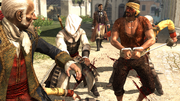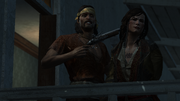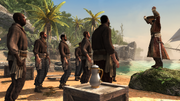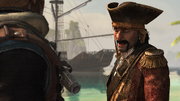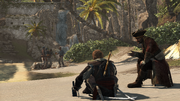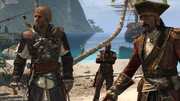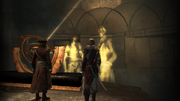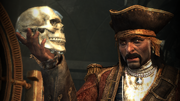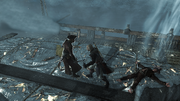m (Corrected spelling/grammar) |
Jasca Ducato (talk | contribs) m (The lead quote is supposed to sum at the article's subject succinctly. This quote does that much better than the previous one. Also, that quote is used in the article already.) |
||
| Line 2: | Line 2: | ||
{{WP-REAL}} |
{{WP-REAL}} |
||
{{Youmay|the individual|the [[Bartholomew Roberts (memory)|memory]]}} |
{{Youmay|the individual|the [[Bartholomew Roberts (memory)|memory]]}} |
||
| − | {{Quote| |
+ | {{Quote|A merry life and a short one, as promised. How well I know myself.|Bartholomew Roberts reciting his motto, 1722.|Assassin's Creed IV: Black Flag|Royal Misfortune}} |
{{Character Infobox |
{{Character Infobox |
||
| image = AC4 Bartholomew Roberts.png |
| image = AC4 Bartholomew Roberts.png |
||
| Line 17: | Line 17: | ||
==Biography== |
==Biography== |
||
===Early life=== |
===Early life=== |
||
| − | {{Quote|I always fancied it should have a placard at its borders: |
+ | {{Quote|I always fancied it should have a placard at its borders: "Welcome to Casnewydd-Bach, the town you have just passed."|Bartholomew Roberts regarding his home town, 1719.|Assassin's Creed IV: Black Flag}}John Roberts was born in 1682 in Castell Newydd Bach. It is commonly assumed that he went to sea around the age of thirteen, eventually becoming an experienced sailor. |
===Imprisonment by Templars=== |
===Imprisonment by Templars=== |
||
| Line 58: | Line 58: | ||
===Death=== |
===Death=== |
||
| − | {{Quote|A merry life and a short one, as promised. How well I know myself.|Bartholomew Roberts reciting his motto, 1722.|Assassin's Creed IV: Black Flag}} |
||
Over the next two years Roberts captured hundreds of ships, earning the attention of both the [[Royal Navy|British]] and [[Spanish Navy|Spanish navies]] as well as the Templars; he was forced to retreat to Príncipe, where he was found by Kenway. Roberts attempted to flee aboard the ''Royal Fortune'', keeping the ''Jackdaw'' at bay with mortar fire and fire barrels, before moving into open waters where Spanish and British forces engaged him. |
Over the next two years Roberts captured hundreds of ships, earning the attention of both the [[Royal Navy|British]] and [[Spanish Navy|Spanish navies]] as well as the Templars; he was forced to retreat to Príncipe, where he was found by Kenway. Roberts attempted to flee aboard the ''Royal Fortune'', keeping the ''Jackdaw'' at bay with mortar fire and fire barrels, before moving into open waters where Spanish and British forces engaged him. |
||
Revision as of 19:50, 15 August 2019
| This article is about the individual. You may be looking for the memory. |
Bartholomew Roberts (1682 – 1722), born John Roberts, was a Welsh pirate and Sage, who raided ships in the Caribbean and on the West African coast between 1719 and 1722.
He is regarded by many historians to be the most successful pirate of the Golden Age of Piracy, judging by the number of ships taken and the amount of goods stolen. For his actions, he earned the moniker Black Bart, although the name was never used in his lifetime. His death is often considered to be when the Golden Age of Piracy truly ended.
Biography
Early life
- "I always fancied it should have a placard at its borders: "Welcome to Casnewydd-Bach, the town you have just passed.""
- ―Bartholomew Roberts regarding his home town, 1719.[src]
John Roberts was born in 1682 in Castell Newydd Bach. It is commonly assumed that he went to sea around the age of thirteen, eventually becoming an experienced sailor.
Imprisonment by Templars
The Templar Order located Roberts sometime in 1715 and subsequently took him to Havana. The Assassin Mentor Ah Tabai caught wind of the capture and sent his finest student, Duncan Walpole, to free Roberts and bring him to the Assassin city of Tulum. However, Walpole had secretly turned traitor to the Brotherhood and instead decided to aid the Templars.
Roberts eventually arrived in Havana, where he was imprisoned in the estate of Laureano de Torres y Ayala. Torres, his fellow Templars Woodes Rogers and Julien du Casse, along with Edward Kenway – who had killed Walpole and taken his identity – met Roberts at the Havana docks before escorting him to the prison.
In transit, he managed to break free when the Templars were attacked by Assassins sent by Ah Tabai, but was chased down by Kenway and escorted to Torres' estate. However, despite his incarceration, Roberts managed to escape later that night and took to the sea.
Slaving in Kingston and Príncipe
In 1717, the Templars learned that Roberts had been recaptured by a Kingston-based slaver named Laurens Prins. Prins had encountered Roberts, but had actually employed him, allowing him to stay in his Kingston estate while planning to sell him out to the Templars.
Kenway, acting on information given by his fellow pirates, confronted Torres and devised a plan to have the Templar Grand Master meet with Prins in Kingston and lead Kenway to Roberts. However, Prins detected Kenway and the Assassin Mary Read and managed to flee back to his mansion.
When Kenway infiltrated Prins' estate and killed him in his gardens, Roberts appeared and held Mary at gunpoint, declaring that Prins had been his employer instead of his jailer. Shooting an alarm bell to alert guards to Kenway's presence, Roberts escaped once more. Afterwards, he took to working aboard a merchant ship of Barbadian origin.
Piracy
- "In honest service there are thin commons, low wages, and hard labour. Yet as gentlemen of fortune we enjoy plenty and satisfaction, pleasure and ease, liberty and power... so what man with a sensible mind would choose the former life, when the only hazard we pirates run is a sour look from those without strength or splendor?"
- ―Bartholomew Roberts to his crew, before his first voyage as a pirate captain, 1719.[src]

Edward meeting Roberts in Príncipe
Roberts eventually began working on board a slave ship called the Princess, captained by Abraham Plumb; this ship made regular trips between Kingston and the Portuguese colony of Príncipe roughly every eight weeks. When the ship was captured by the Welsh pirate Howell Davis, Roberts chose to become a pirate himself. During his time sailing with Howell, he served as Navigator and consultant to the captain, with the two having a particularly strong bond as a result of them both being able to speak Welsh. On 19 June 1719, Davis was killed in a Templar-orchestrated ambush at Príncipe, forcing Roberts to go into hiding.
Approached by Kenway once again, the two struck a deal: Kenway would free Roberts' imprisoned crew and kill the Templars John Cockram and Josiah Burgess, in exchange for Roberts leading him to the First Civilization site known as the Observatory; Kenway did as he was asked, recapturing the Princess in the process. Roberts donned Davis' outfit and then gave a speech to his crew, declaring his intentions to sail as a pirate, before the two captains returned to the West Indies.
In the following months, Roberts made a name for himself by taking ships and making a fortune. He kept his crew to high standards with an eleven-part creed; it discouraged gambling on the ship, required the men to keep their equipment in good working order, and provided that pirates should live their lives as fully as possible and die before they became weak and old, vulnerable to having their power stripped from them: a philosophy he summed up with the words "a merry life and a short one."
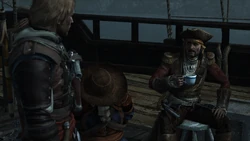
Roberts on his ship
Roberts and Kenway met again off the coast of the Yucatán Peninsula, where they infiltrated a Portuguese camp to steal First Civilization crystal vials that had been imbued with the blood of both pirates and Templars alike. After completing the heist and commandeering the Portuguese flagship, Nosso Senhor da Compreensão, Roberts renamed her to the Royal Fortune. Afterwards, Kenway killed his former comrade Benjamin Hornigold, who had allied himself with the Templars, to ensure the pirates were not followed, before meeting Roberts again at Long Bay, on the northern shore of Jamaica. The two went ashore with four of Roberts's crew in search of the Observatory.
The Observatory
- "Dirty and decrepit. Not quite as I remember. But it has been over 80 millennia."
- ―Bartholomew Roberts, on the Observatory, 1719.[src]
Edward cleared the jungle of its protective Guardians while Roberts and his crew followed until they reached the Observatory's door. Upon opening it with an incantation, Roberts suddenly shot his four crewmen dead, telling Kenway he did it to save them from the insanity that was sure to follow if they entered the building. However, he believed that Edward would be able to handle the secrets stored within, and instructed him to take up the case of blood vials before they made their way inside.
Roberts informed Kenway of his past as a Sage and his new life as a pirate, including his pirate's creed, as they made their way deeper into the Observatory. He commented on the complex being in much worse condition than what it had been when he last saw it eighty millennia ago, although he still knew how to deactivate the building's security measures once inside.
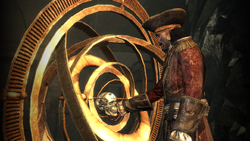
Roberts operating the Crystal Skull
In the Observatory's antechamber, Roberts showed Kenway exactly what its purpose was, using the blood vials they had taken from the Portuguese and inserting them into a Crystal Skull set into the centerpiece of a golden armillary sphere. Soon, the machine began to operate, projecting the vision and hearing of the individual whose blood was in the vial - a near perfect method of spying on anyone in the world; this was demonstrated as both Roberts and Kenway surveyed through the eyes and ears of Jack Rackham and Woodes Rogers.
Although Kenway agreed with Roberts that the Observatory would be too powerful for the Templars to have control of, Roberts had a different plan on how to stop them, by removing the skull and rendering the Observatory inoperable. Though Edward had hoped to work with Roberts and use the device to increase their wealth, the Sage had other ideas, knocking him into the water below. Revealing that he had only used Kenway to get to the Observatory and acquire the Crystal Skull, Roberts declared Edward's usefulness to be at an end and sealed him inside the temple.
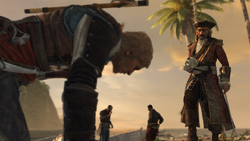
Roberts capturing Edward
Roberts returned to the shore and ordered his crew to subdue the injured Kenway, who had made his way out of the Observatory. Though Edward fought back against the pirates, he eventually collapsed from his injuries, just as the Jackdaw sailed away. Knowing that Edward had a large bounty on his head, Roberts decided to turn him over to the British authorities.
Death
Over the next two years Roberts captured hundreds of ships, earning the attention of both the British and Spanish navies as well as the Templars; he was forced to retreat to Príncipe, where he was found by Kenway. Roberts attempted to flee aboard the Royal Fortune, keeping the Jackdaw at bay with mortar fire and fire barrels, before moving into open waters where Spanish and British forces engaged him.

Bartholomew's final moments
Eventually the Royal Fortune was disabled by the Jackdaw and boarded. There, Bartholomew Roberts and Edward Kenway fought one another, with Kenway emerging the eventual victor, having impaled Roberts with a rope dart.
Roberts first noted the aptness of his motto before remarking that he may have misjudged Kenway, and perhaps he was indeed the one 'she' had sought. Roberts expressed regret that like many other Sages of his time and before him, he was born too early, and that he did not have the time to open the door to the Temple and get to hear her call him by his real name Aita, confusing Edward, who demanded he talk sense. Roberts did not elaborate, requesting only that Edward destroy his body in order to prevent the Templars from gaining anything from it, before succumbing to his injuries. Edward then complied with his final request and threw his body overboard.
Trivia
- Roberts could be seen wearing a portrait necklace, depicting a visage of a woman, identical to the one worn by John Standish, one of Aita's later incarnations.
- Roberts acquired his outfit from Howell Davis, the Princess' former captain, after the latter's death at Príncipe.
- Historically, Roberts was known to be one of the few Gentleman Pirates, having established a strict pirate code as a captain. Additionally, he died when he succumbed to an attack by the British Royal Navy ship of the line HMS Swallow. A full broadside unleashed by the Swallow ripped Roberts's throat out with grapeshot, and he was buried at sea by his crew at his own request.
- Also, despite his character, he committed a serious atrocity in the burning of the slave ship, Porcupine, where many innocent sailors and slaves were killed after the crew refused to surrender. This incident is not mentioned by any character in the game, but Edward does recall it while pursuing him in the novelization.
- In real-life, Roberts was one of the most successful pirates of all time, believed to have captured more than 400 ships during his career. He is generally considered the most successful pirate of the Golden Age of Piracy, although the most successful pirate of all time is considered to be Ching Shih of China, a female captain who personally commanded over 300 junks (Chinese ships) with a force of anywhere from 20,000 to 40,000 pirates at any given time. In the Assassin's Creed series, this record is surpassed by the pirate and Assassin Samuel Bellamy, who is estimated to have captured hundreds of millions of dollars worth of gold and treasures in his short career.
- Roberts' mention of a Temple and Juno may have contributed for Edward's later years researching of the Grand Temple and the key that allowed Desmond Miles to retrieve it and stop the impending solar flare in 2012.
Gallery
Appearances
References
| |||||||||||||||||||||||||



